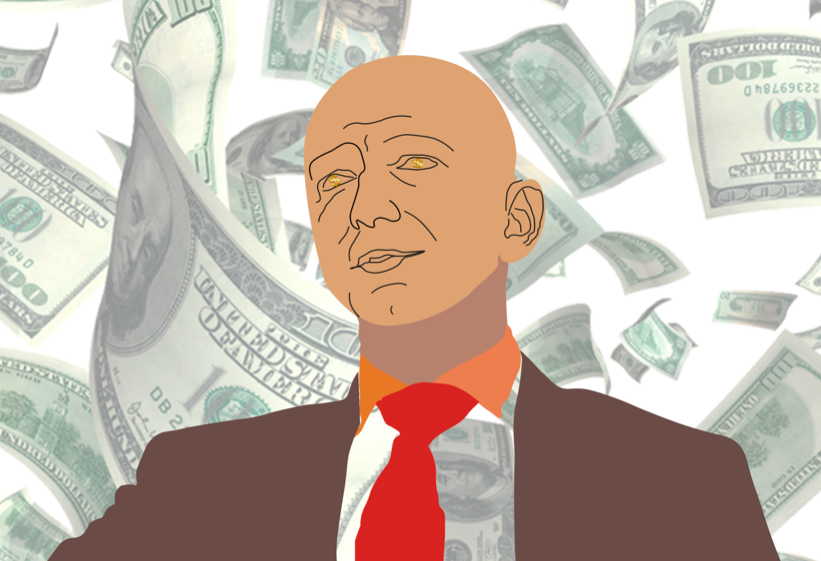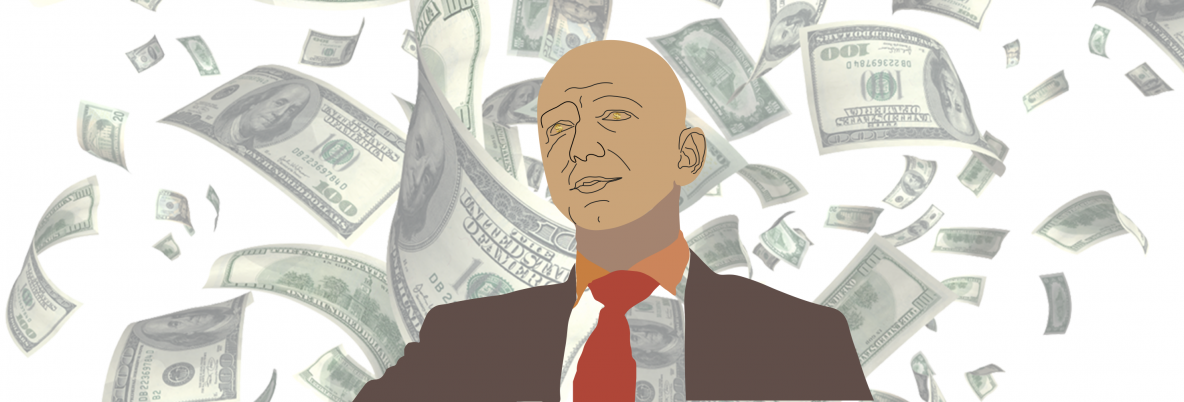IS BEING A BILLIONAIRE ETHICAL?
It's time to change the conversation around billionaires
By Anusha Persson / 26 August 2020

Illustration by Lena Blacker
The image of a billionaire is enticing – the idea that anyone can earn a huge amount of wealth and beat the system is the basis of the famed American dream.
Our culture is obsessed with this concept, many of us read ‘The Sunday Times Rich List’ every year; we are inundated with tips from supposedly self-made millionaires and we are fed ideas about how college dropouts end up creating companies that change the world forever. However, it’s time we changed the conversation. Billionaires are not the product of 21st-century meritocracy but, rather, a reminder that our system is a bloated fallacy that rests on the extortion of the more vulnerable in society.
But why now? We are currently living through one of the most destructive periods in history, which is damaging those that live in society’s margins - working classes, ethnic minorities, people with disabilities. People are becoming unemployed in droves and we are in the midst of a global recession. Thus, it is more important now than ever to question the ethicality of hoarding wealth.
But what has happened to the billionaire? As COVID continues to reshape the world as we know it, and we are increasingly aware of the desperate situations that people are facing, the extent to which billionaires are growing their wealth is starting to feel more and more obscene. It feels out of touch that many billionaires have seen huge increases in their wealth, by as much as $434 billion between mid-March and mid-May. Two prominent billionaires – Amazon’s Jeff Bezos and Facebook co-founder Mark Zuckerberg – were declared the most wealthy, earning an extra $34.6 billion and $25 billion respectively. This is grotesque in the context of the huge recession facing America and the rest of the world – these men are profiting from our own difficult situations. Amazon is where we have turned to for basic resources, and Facebook has been how many of us have kept in touch with friends and family.
The increasing public dislike for massive wealth hoarded by the likes of Bezos and Zuckerberg has only been exacerbated by the activities of the Kamani brothers, billionaire owners of BooHoo and Pretty Little Thing.
Like Bezos, the Kamani brothers are under fire for the exploitative practices in their Leicester factories, where people have been working in unsafe conditions without social distancing, under minimum wage. These factories in Leicester have prompted comparisons to garment factories in Bangladesh, where many British billionaires like Philip Green and Philip Day have amassed huge wealths on the backs of exploited garment workers, in what has been considered modern day slavery.
News of exploitative practice is nothing new in relation to Amazon, prompting many, like myself, to attempt to boycott the brand. The image of Bezos himself in the public consciousness is a uniquely evil one. His riches have been immortalised in a game in which players attempt to spend them in their entirety, whilst on Twitter, the account @hasbezosdecided tweets daily that Bezos has decided to not end world hunger, whilst providing followers with anti-billionaire resources. The social media desk at Metro Newspaper also attempted to spend Bezos’ inordinate wealth in this incredible twitter thread, a powerful visual signifier which shows how ridiculous the wealth of a billionaire is.
This brings us to the crux of the conversation: how can it be considered ethical for one person to command this amount of wealth?
Even trying to comprehend a billion as a number is difficult – it would take 31 years to count (including the time you spend asleep) to a billion. The vast majority of us will never know anything close to that kind of wealth. Whilst many of the world’s problems will not be eradicated by throwing money at them, money is a good place to start, and wealth distribution would surely ensure greater equality.
HELPFUL FACTS TO KEEP IN MIND:
- Jeff Bezos makes $2,489 per SECOND, which is more than twice what the average US worker makes per week.
- If you made $5,000 a year every day starting in 1492, you would have less money than Bezos
- Three billionaires – Bill Gates, Jeff Bezos and Warren Buffet combined – have more wealth than 160 million Americans.
- The average American’s dollar has the same significance as Bezos spending $1.3 million
- The world’s richest 26 people have the same wealth as the poorest 50%.
By now, is it even radical to say that billionaires should not exist? Wealth hoarding and tax evasion are harmful to our economy and hold us back from making actual, meaningful change.
People have estimated that for America, tax avoidance could cost upwards of $5 trillion in the next decade, all down to the top 1%. This is not just an American problem: a 2019 Times Investigation found that ⅓ of British billionaires had moved to a tax haven.
So, as it seems, those that can, do. And the rest of us? Well, we pay our taxes.
People argue that billionaires, however, pay back their taxes via philanthropic actions – famous examples include Bill Gates or Warren Buffet promising to give away oodles of their wealth to deserving causes. Recent recipients have included Coronavirus relief funds, clean sanitation services and financial initiatives. Billionaires have been known to donate a lot of money: Bill and Melinda Gates are estimated to have donated around $45.5 billion to recipients around the world. This is certainly an enticing justification for billionaires, who are able to provide charitable donations well beyond the scope of the average person.
However, this behaviour in itself is inherently problematic, and nowhere near enough. Philanthropy is essentially an exercise in power, as untransparent, undemocratically elected foundations donate money to charities without trying to change the structural issues that cause the problem. It is also inherently paternalistic, cherry-picking the issues which may appear non-threatening and boosting them without addressing those at the core. It is a fundamental readdressing of the issue that does nothing to challenge the power imbalances which created the disparity between mass wealth and poverty in the first place, and thus enabled billionaires to exist.
Billionaires, rather than symbolising meritocratic society, in fact impede progress. They exist at the core of a broken system which fails to promote equality and recognise the abhorrence of hoarding wealth. Instead of accepting and celebrating billionaires, we need to change our conversation and demand change.
Art by
Words by
Share this article

